
OR
#Int’lWomen’sDay2021
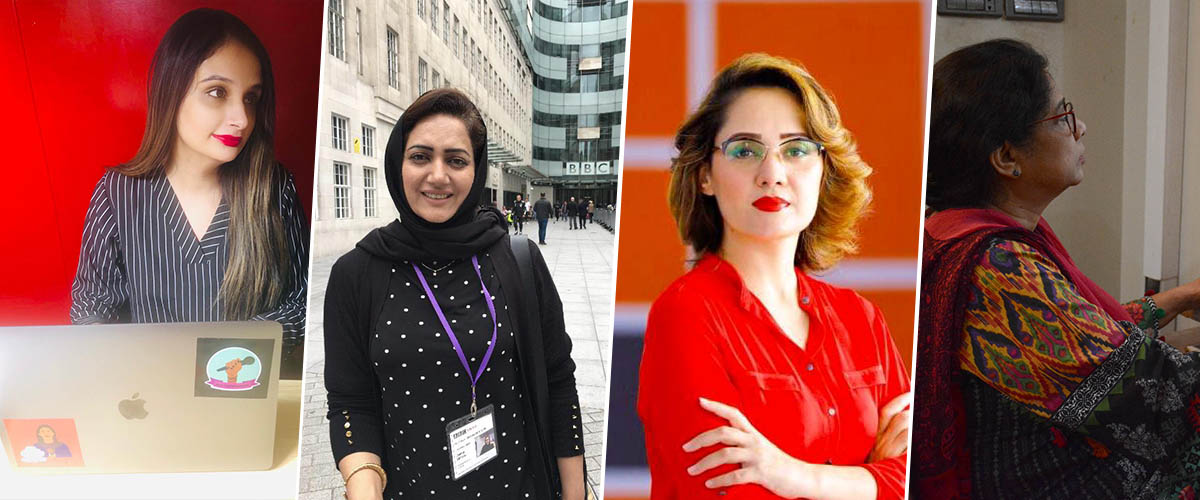
More from Author
Women journalists in Pakistan work in a hostile environment. Only the fittest can survive.
“Sometimes I think they just wanted to scare me, but then I think maybe they wanted me dead,” says Bisma*, a journalist well known for her progressive views. One evening in February 2019, several shots were fired right outside her house. She has never spoken about the incident to anyone except her immediate family, her boss and the head of the media company she works for — all of whom believe it was due to her reporting.
It had been a year since Bisma had done a particular story and started getting threatening calls warning her to “watch out”, the tone in each subsequent call turning aggressive. “I never thought they would show up at my doorstep,” she says. Fearing further repercussions, she kept quiet, and has since then drastically cut down her social media presence. “The message was pretty clear.”
Such ‘messages’ have become increasingly common, and even more deadly. Over the years, Pakistan has earned a reputation of being a hard country for journalists. At least 61 reporters — all men — have been killed in the line of duty since 1992, according to the Committee to Protect Journalists. It ranked 145th out of 180 countries in Reporters Without Borders’ World Press Freedom Index 2020.
Most women journalists Dawn reached out to say reporting is the easiest part. Far more difficult is the continuous battle to create and hold onto spaces within male-dominated newsrooms and public places while fighting misinformation, deeply personal attacks and misogyny — both offline and online — which is overwhelming some of the most courageous and dedicated women journalists in Pakistan.
On Aug 12 last year, a group of women journalists issued a statement against government-affiliated social media accounts and supporters. “Vicious attacks through social media are being directed at women journalists and commentators in Pakistan, making it incredibly difficult for us to carry out our professional duties,” the statement said, adding: “In what is certainly a well-defined and coordinated campaign, personal details of women journalists and analysts have been made public. To further discredit, frighten and intimidate us, we are referred to as peddlers of “’fake news’, ‘enemy of the people’ and accused of taking bribes (often termed as ‘paid’ journalists or lifafas).”
The statement led to another round of virulent online abuse and harassment that was enough to make most women journalists — many of whom had not signed the petition fearing a backlash — worry that these threats could translate into real attacks.
“If there was a World Cup for getting trolled, I would have won it,” quips Asma Shirazi, a signatory to the petition. Host of a flagship political talk show on Aaj News and one of the country’s top rated anchors, Shirazi left PTV to join Geo TV in 2002 when there were hardly any women doing political reporting. “In 2007, during Musharraf’s rule, I was banned from TV along with some others,” she says. “Back then, we would get threats, someone would follow us or a message would be delivered via messengers, but all records were smashed after 2011 when social media especially Twitter became big. There is an extensive campaign to discredit pro-democracy voices. I have been a victim of fake news so often that I have gotten used to it. My private pictures are often doctored and leaked. I can’t fight with the forces [behind these attacks], all I can do is stand by the ideology I believe in.”
“For women in Pakistan, there is no safe space,” contends Gharidah Farooqi, a current affairs talk show host on NewsOne. Abuse hurled her way includes allegations of extramarital affairs with political figures. “During the 2014 dharna, accounts associated with PTI ran a campaign against me and I was also physically attacked while reporting on the sit-in,” she says.
Many women journalists told Dawn that whenever they write a political story or even tweet an opinion deemed unfavourable to the PTI, the security establishment or the corporate sector, they are mercilessly trolled. The backlash, which ranges from threatening phone calls to doxxing, in the case of political trolling, amplified if verified party accounts jumped in.
Hostile newsrooms
Many women reporters also describe the environment of the newsrooms as hostile; male journalists can be their female colleagues’ worst enemies.
Pakistan’s first female chief reporter and Karachi bureau chief Rafia Haider would certainly agree. In a career spanning 30 years at the Associated Press of Pakistan (APP), the state-run ‘premier’ news agency, she has reported extensively on health, environment and human rights.
Her male colleagues are not keen on taking directions from a woman chief reporter. Haider has been repeatedly subjected to online and offline vilification campaigns. “The most laughable thing was that recently my colleagues sent a letter to Prime Minister Imran Khan, implying that I am a coronavirus-denier and am forcing them to work in a pandemic when all I was doing was following orders from the head office,” says Haider. A year away from retirement, and weary of the bullying, she often contemplates quitting.
Similarly, Multan-based Rakshsanda Nayyer, a reporter with over two decades of experience at NawaiWaqt newspaper, accuses her colleagues of making it impossible for her to work. One day she filed a story on the challenges faced by female lawyers in her hometown, which ended up on the front page of NawaiWaqt Multan as well as in all other editions. “When I went to work, the beat reporter was furious and threatened to break my legs. ‘I will burn you, I will burn this face of yours that you go around with’ were his words,” she remembers. It took an intervention from several media colleagues to get the man to back off. “But the resident editor actually asked me why I was interfering with his beat.”
For female television reporters, stepping into the public domain means facing crowds of leering men. “Someone will try to touch your back or bottom, grope you or scream loudly in your ear,” says Naheed*, a young TV journalist. “But the worst are the cameramen themselves who try to take advantage of new girls by offering to adjust their collar mic”. Other women reporters have similar tales to tell; complaining means being labeled ‘difficult’ and losing out on choice assignments.
The ‘Protection Against Harassment of Women at the Workplace Act 2010’ stipulates that every organisation must adopt the Code of Conduct prescribed by the law and ensure it is displayed noticeably in languages understood by the majority of employees. Failure to do so is punishable by a Rs100,000 fine. In practice, many media houses are reluctant to comply with these directions.
Talking to Dawn, Provincial Ombudsman Sindh for Protection Against Harassment at Workplace retired Justice Shahnawaz Tariq says: “Journalists, including women reporters, like many others working in the private sector, do not enjoy legal protections from being easily terminated that are available to those working in the public sector if they file a complaint against harassment at the workplace. The fear of losing employment and possibly killing one’s career prospects acts as a deterrent which discourages women from coming forward with harassment complaints.” Since 2010, only one case — involving a media company and a female radio host — has been lodged with the provincial ombudsman. The case was decided in her favour and the accused convicted.
For women in Pakistani media, most days are the equivalent of climbing a personal Everest, navigating harsh terrain and bottlenecks, where a slight misstep can put paid to one’s job, reputation and sanity, and where their experience of offline and online abuse is dismissed as an ‘occupational hazard’. This is unacceptable. They need assurance from their employers as well as from the state that when they talk of being doxxed, trolled, surveilled or physically attacked, they are not dismissed as being paranoid and told to ‘toughen up’. Instead, their tormentors must be brought to book.
*Some names have been changed for the sake of privacy.
Jajja is a Pakistani journalist, and she works with Dawn
You May Like This
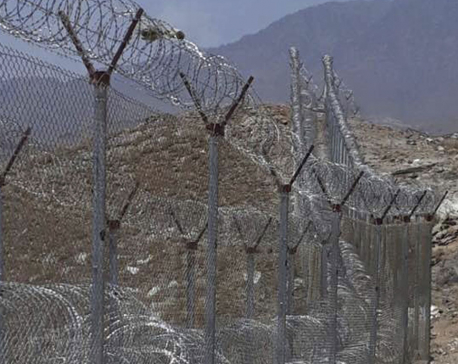
Pakistan begins building border fence over Afghan objections
ISLAMABAD, June 21: Pakistan said Tuesday that it has begun building a fence along its border with Afghanistan to improve... Read More...

Nepal's ambassador to Pakistan calls for more trade and investment
KATHMANDU, Nov 29: The Embassy of Nepal organized an interactive program with the Rawalpindi Chamber of Commerce and Industries (RCCI)... Read More...
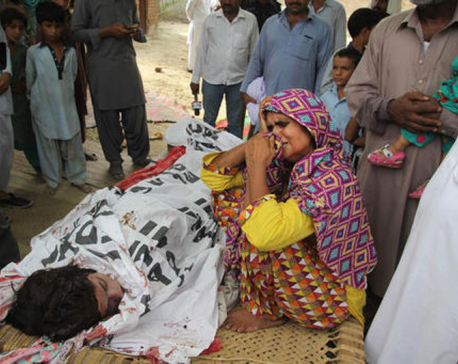
Pakistan Honor victims
ISLAMABAD, Oct 3: Tasleem was just 18 years old when her brother shot her in the head. Her crime was marrying... Read More...
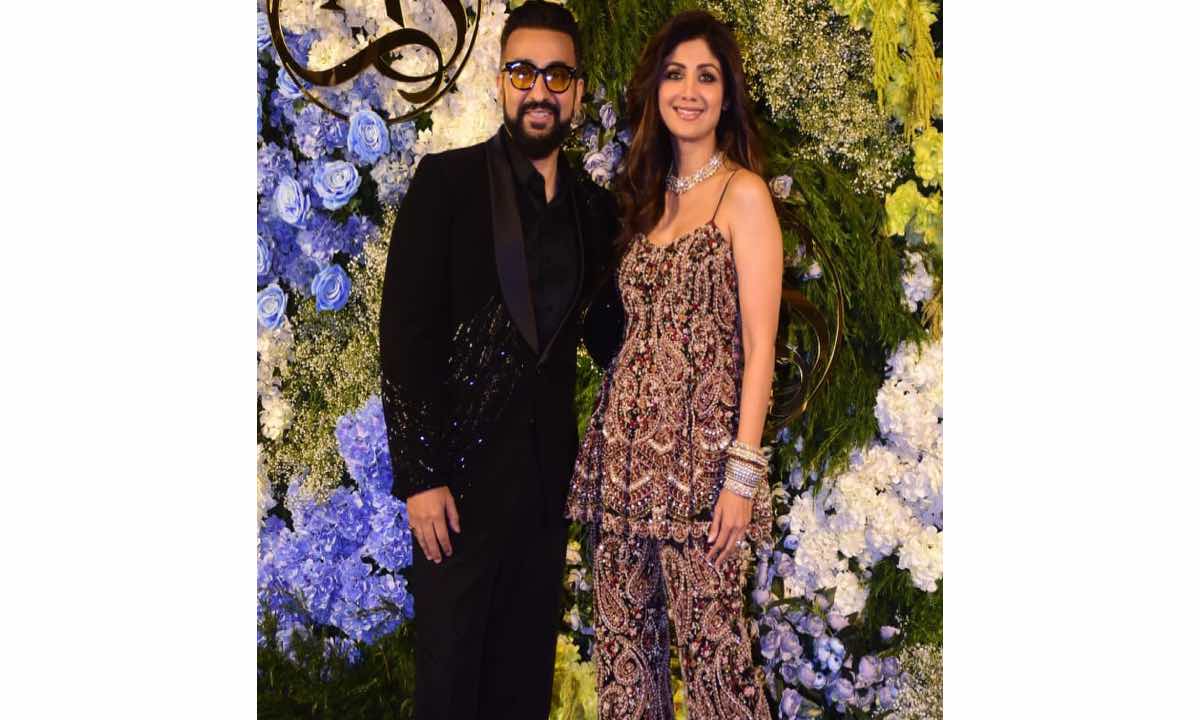
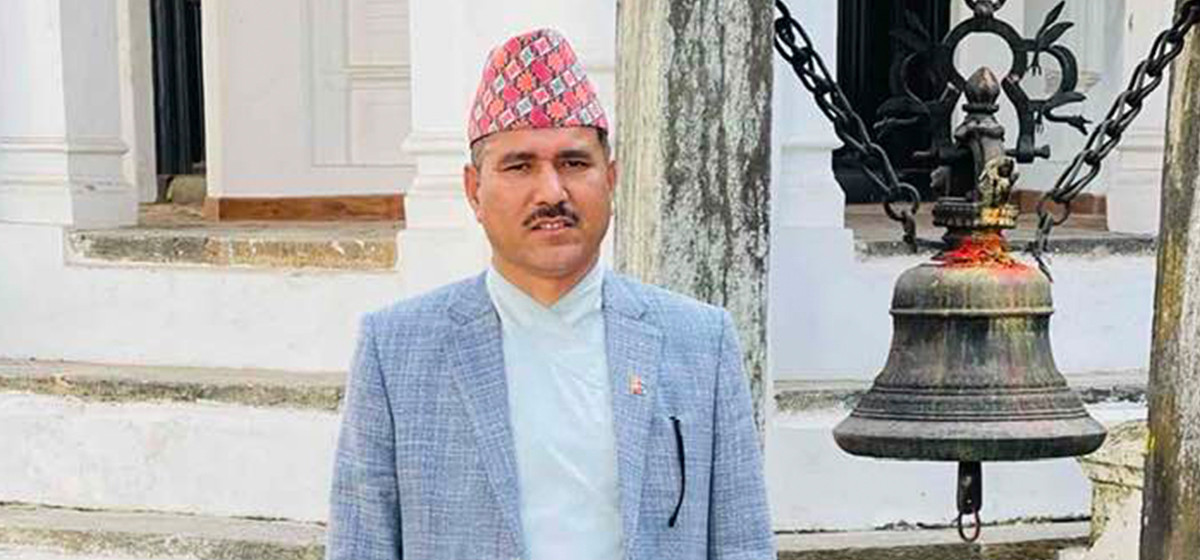
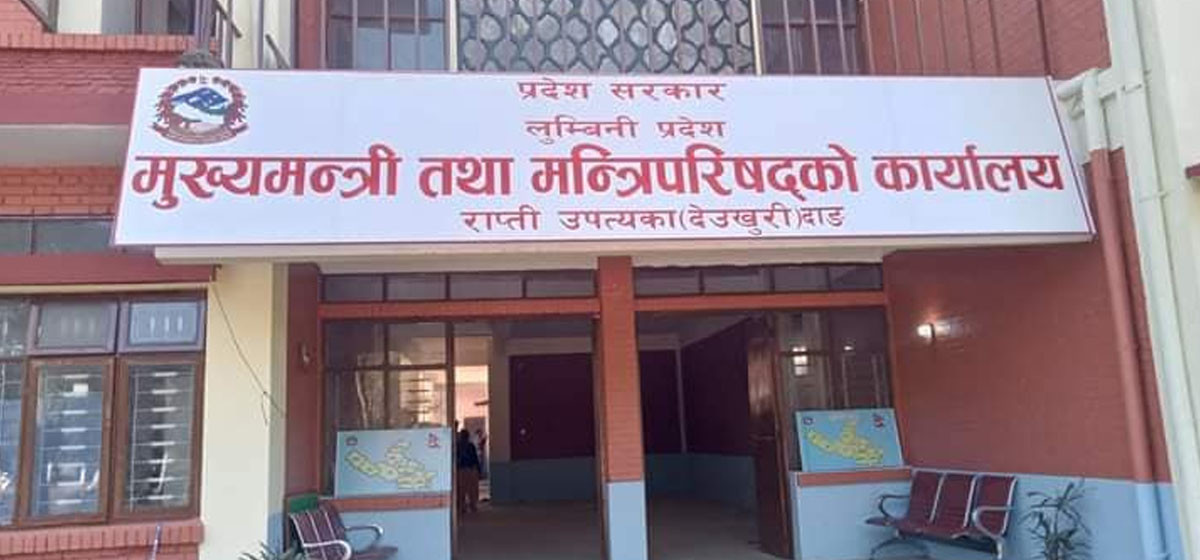
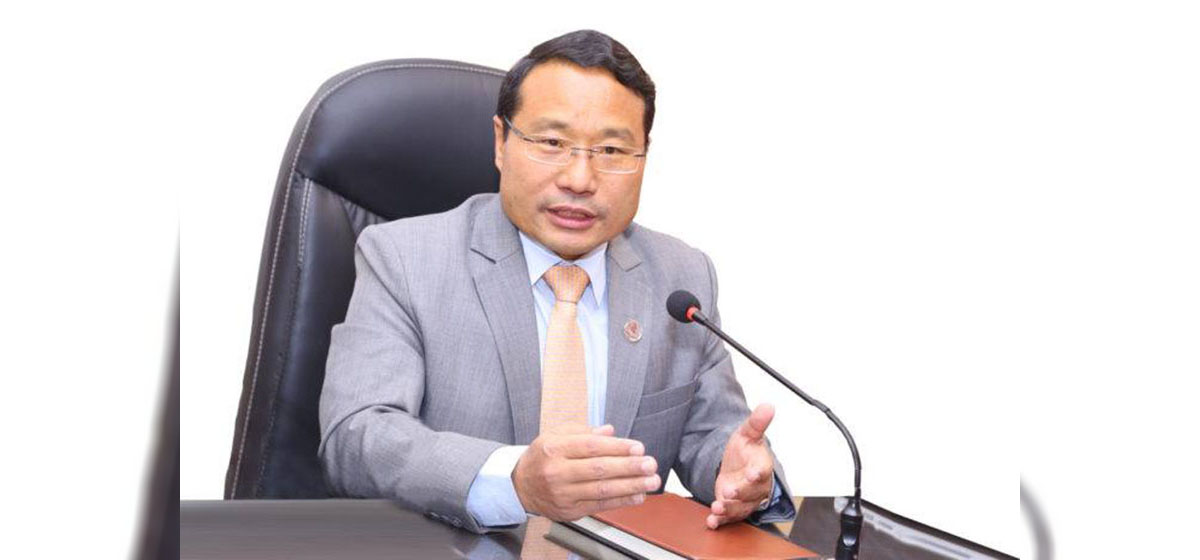
Just In
- ED attaches Raj Kundra’s properties worth Rs 97.79 crore in Bitcoin investment fraud case
- Newly-appointed Auditor General Raya takes oath
- CM Mahara expands Cabinet in Lumbini Province
- FinMin Pun addresses V-20 meeting: ‘Nepal plays a minimal role in climate change, so it should get compensation’
- Nepalis living illegally in Kuwait can return home by June 17 without facing penalties
- 'Trishuli Villa' operationalized with Rs 100 million investment
- Unified Socialist rejoins Lumbini Province govt following ministry allocation
- Police release ANFA Vice President Lama after SC order













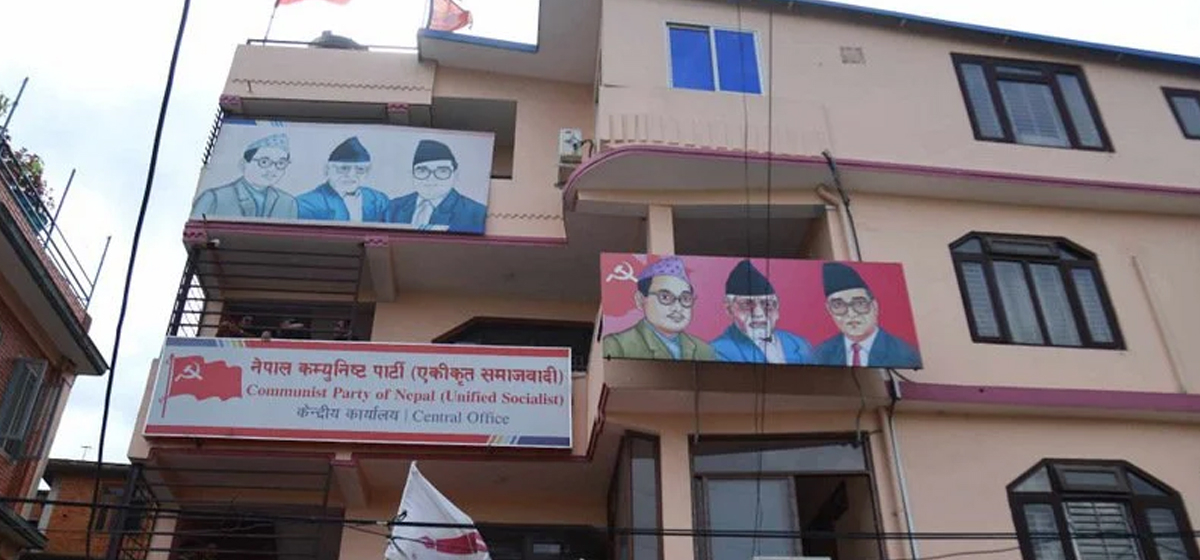

Leave A Comment